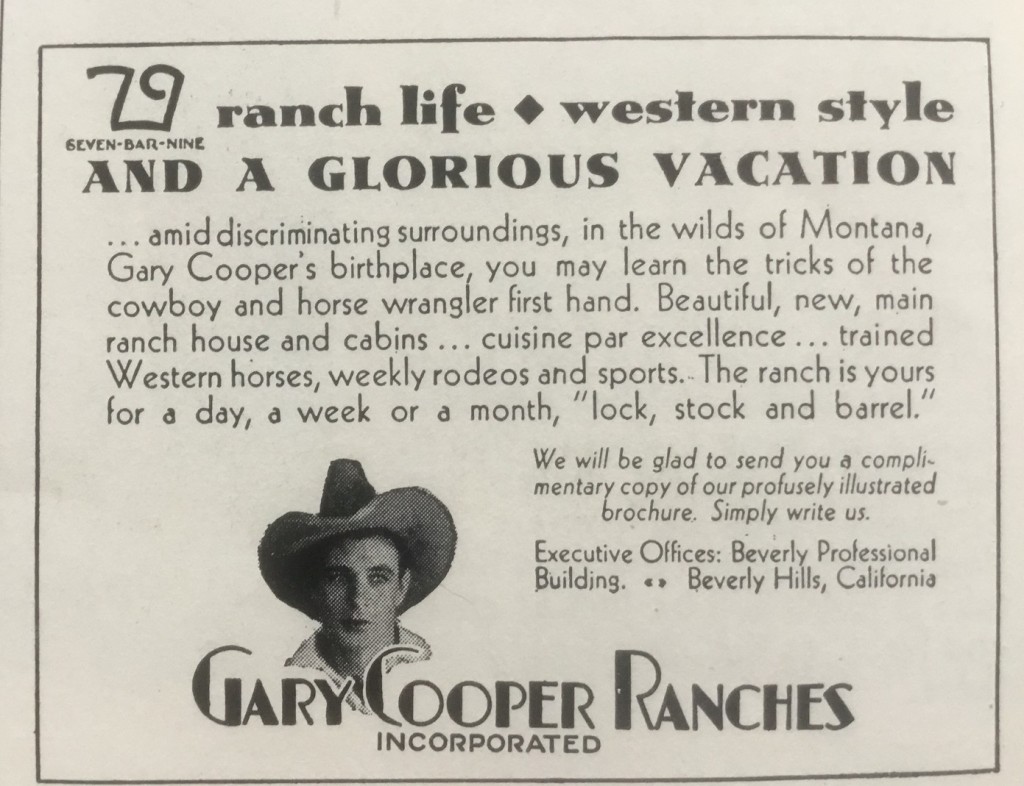On August 4, 1928, Helena, Montana newspaper The Independent-Record ran a story with the heading, “Gary Cooper Promotes Dude Ranch for Hollywood Stars.” A series of dude ranches was being planned to bridge Yellowstone and Glacier national parks. Not only that, the ranches were expected to draw movie stars from Hollywood.
One of those stars was behind the scheme: Gary Cooper. Here’s how he was described in the article: “The promoter of the enterprise is Gary Cooper, a former Bozeman boy who is now a prominent screen actor with the Paramount company.” By this time, he had started to make a name for himself in films like The Winning of Barbara Worth, and the 1927 silent film Wings, which won the first Academy Award for Best Picture. His super stardom would come in the following decade, but the power of his name was growing.
Which is why he agreed to be part of the dude ranch plan, which had actually been proposed by his father, Judge Charles Cooper, who owned a cattle ranch north of Helena. It was an ambitious undertaking: the ranches would have fishing, hiking, a rodeo, polo fields, an archery range, and a field for private plane landings. The first structures were completed by 1929 in Cascade County and were in spitting distance of today’s Nine Quarter Circle dude ranch. Christened Gary Cooper Ranches, the place was ready for guests in June of 1930.

By 1932, the ranch was a bust. Carl M. Hansen of Los Angeles, president of the International Re-Insurance Corporation, was also the major financial backer and sued the Coopers for defaulting on their note. He foreclosed and then ran the ranch with the Cooper name for a couple of years before selling it off. (In 1934 he was indicted for using the mail to defraud the stockholders of his insurance company.)
The story of Cooper’s attempt to run a dude ranch didn’t lose its appeal and was featured in a number of newspaper articles well into the 1930s. Here’s an example of one story from January of 1935:
“Gary Cooper started a dude ranch as his means of getting a well assured outside income. But with Gary’s presence demanded at the studios most of the year, the visiting ‘dudes’ felt cheated because he was not there to boot and saddle them, so he gave it up sadly.”

Courtesy The Dude Ranchers’ Association
Cooper wasn’t bitter about his dude ranch debacle. In January of 1937 he published an article in The Dude Rancher, the magazine of the Dude Ranchers’ Association. Titled, “To The Dude Rancher,” it was a well-crafted essay about the importance of dude ranching, and a plug for the movies he’d made in Montana. The introductory paragraph, written by the editor of the magazine, described the actor as “…a former resident and Dude Ranch operator in Montana, who has added another chapter to the history of his colossal success.”
A studio publicist probably wrote the first-person magazine piece, but Cooper obviously wasn’t worried about being associated with dude ranching, despite failing in it himself. One paragraph reads:
“The dudes came West and learned the joys of ranch life. They rode horses, roped, fired a gun and, all-in-all, began to get some of the open country in their blood. It’s a fine thing for any man–or woman, either–and I’m glad to see them going for it in such numbers, at last.”
In the final line Cooper says he thinks running a dude ranch is a great occupation. “I’ve tried it once and may have another fling at it one of these days.”
He didn’t, and his former property has been in private hands for decades. But disappointed dude rancher or not, thanks to films like The Virginian, The Westerner, Along Came Jones, and High Noon, Bozeman boy Gary Cooper will always be associated with the West.
Great story that’s the kind of stuff people love a touch of nostalgia but something that they can bring into a new experience in their life
Stan
>
LikeLike